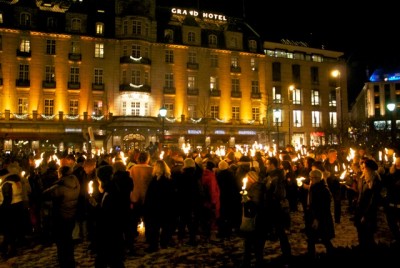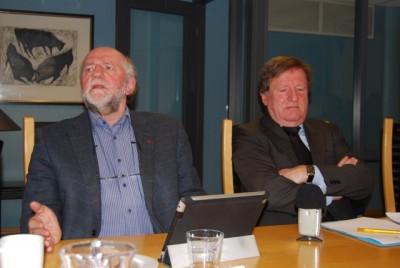NEWS ANALYSIS: When more than two dozen European prime ministers, presidents and top EU officials land in Oslo over the next few days, they’ll be met not only by a predicted snowstorm but also by a storm of criticism over the Nobel Peace Prize they’ll be receiving. Even the torchlight parade traditionally held in honor of Peace Prize winners has been divided by conflict over this year’s choice.

Few issues stir up so much conflict in Norway as the EU, and the visiting Europeans shouldn’t take it personally. The Norwegian Nobel Committee, at least, will give them a warm welcome but it will be hard for them to ignore the objections being voiced not only to the Peace Prize but to the EU itself.
There’s normally, for example, one large “parade for peace” marching up Oslo’s central boulevard known as Karl Johans Gate and ending in front of the Grand Hotel, where the Peace Prize winners stay. It’s traditionally held from around 6-7pm, after the prize has been awarded and before the winners are guests of honour at a banquet inside the hotel.
This year there will be two parades, the traditional one on Peace Prize day and a protest parade the day before. The organizers of the traditional parade (Norges fredsråd) didn’t want to back it this year because they don’t view the EU as a worthy winner. They, along with more than 30 other groups including the long outspoken Nei til EU (literally, “No to the EU”, which has battled successfully to keep Norway out of the EU), have opted to instead arrange a seminar and parade against the awarding of the Peace Prize to the EU. It will take place late Sunday afternoon, after the traditional Nobel press conference with the winners on December 9 and before the Peace Prize ceremony on December 10.

The traditional parade is instead being organized by groups that have no objections to the prize and/or support the EU, including, interestingly enough, many organizations representing foreigners in Norway like the International Students Union, Den polske klubben (The Polish Club), the Lithuanian association and the Oslo International Club. It illustrates how they, perhaps more than Norwegians growing up and living in their annerledes (contrarian) little country in the Far North, understand the importance of integration, European and otherwise. United under a so-called “alliance for peace,” they also include members of Norway’s conservative think tank Civita and Europabevegelsen, the opposing organization to Nei til EU.
The local drama over the Peace Prize, including earlier controversy over an alleged boycott of the Peace Prize ceremony by the coalition government’s anti-EU Center Party, has left many top politicians, Nobel and EU officials and international commentators shaking their heads over what some call Norwegian “provincialism.” While opposition and free debate are deeply engrained within Norwegian society, even many EU skeptics think the reaction to this year’s Nobel has gone too far, and further politicized the prize. Some members of Norway’s Labour-led government seem embarrassed by all the fuss.
“We have a strong tradition of standing up for Peace Prize winners, and I think it’s strange that we face this type of counter-demonstration,” Norwegian Foreign Minister Espen Barth Eide of the Labour Party told newspaper Aftenposten last week. “500 million Europeans are glad that the EU has contributed towards keeping the peace in Europe, and there’s a bit too much navel-gazing when our own debate on EU membership puts its mark on what otherwise is a day of celebration for Europe.”
Some of his own government colleagues, however, from both the Center Party and the Socialist Left party (SV) will be out marching in the “counter-demonstration” on Sunday and there are also left-leaning Labour Party officials who are critical of the EU as well. They’re mostly keeping still, though, in a show of respect for the prize. At least the opposition to the prize by government members themselves helps prove that the Norwegian Nobel Committee operates independently from the government and does not act in line with government policy, as Chinese leaders wrongly claimed when they were upset over the awarding of the Peace Prize to Chinese dissident Liu Xiaobo two years ago.
Conflict ‘old-fashioned,’ ‘hard to understand’
Much of the opposition may be rooted in what some see as declining respect for the prize itself, following years of controversial choices like former US Secretary of State Henry Kissinger, the late Palestinian leader Yasser Arafat and, more recently, US President Barack Obama. Criticism also has raged for years that the prize is indeed political, and that the Norwegian Nobel Committee doesn’t adhere to the terms of Alfred Nobel’s will. That is just as consistently rejected by the committee itself and those who claim any choice could be seen as “political.” The committee often seems to want to encourage struggling champions of human rights, peace movements and even embattled organizations like the EU, at a time when they need it most.
An informal poll conducted by Aftenposten of commentators in leading newspapers in the UK, Germany and fellow Scandinavian countries Denmark and Sweden elicited comments like “strange,” “hard to understand” and even “old-fashioned” when asked for their reaction to the dissent over the prize in Norway. Even an editor at The Guardian, who stressed that many British are hostile to the EU at present, couldn’t understand some of the reasons for the objections, rejecting one that involves alleged moves by the EU to build up militaries and arms, not reduce them in line with Nobel’s will.
Ambassador vs EU opponent
The EU’s ambassador to Norway, Janos Herman, met foreign correspondents in Oslo this week along with the leader of Nei til EU, Heming Olaussen. The latter is among the loudest opponents to the prize, said he’ll be carrying a placard on Sunday that the EU is “not a worthy winner” and stressed that the criticism is directed at the Norwegian Nobel Committee and alleged moves by its chairman, Thorbjørn Jagland, to keep encouraging Norway to join the EU. Olaussen called this year’s Nobel Peace Prize a “provocation,” that’s being responded to in kind.
Herman said it was “difficult” for him to comment on whether the EU deserves the prize, and that the EU itself is “difficult to describe” because of differences among all its member countries.
“But it’s also an idea, an ideal, to create an entirely new Europe (after decades, even centuries, of war),” Herman said. The EU, he said, now stresses European integration, and “promoting closer and closer cooperation” among its members. Janos, a Hungarian, said he comes from what had been a particularly “stormy” part of the European continent, that is being transformed under the EU. He said he was comforted to note that Norway, despite refusing to join the EU, “so often is on the side of the European Union” because of “shared values” and the need to promote “peace and understanding.”
EU officials arriving in Oslo will likely ride out the storms they’ll face, and would be well-advised to bundle up, to fend off the sub-freezing temperatures, snow and icy conditions they’ll meet, at least outdoors.
Views and News from Norway / Nina Berglund
Please support our news service. Readers in Norway can use our donor account. Our international readers can click on our “Donate” button:

